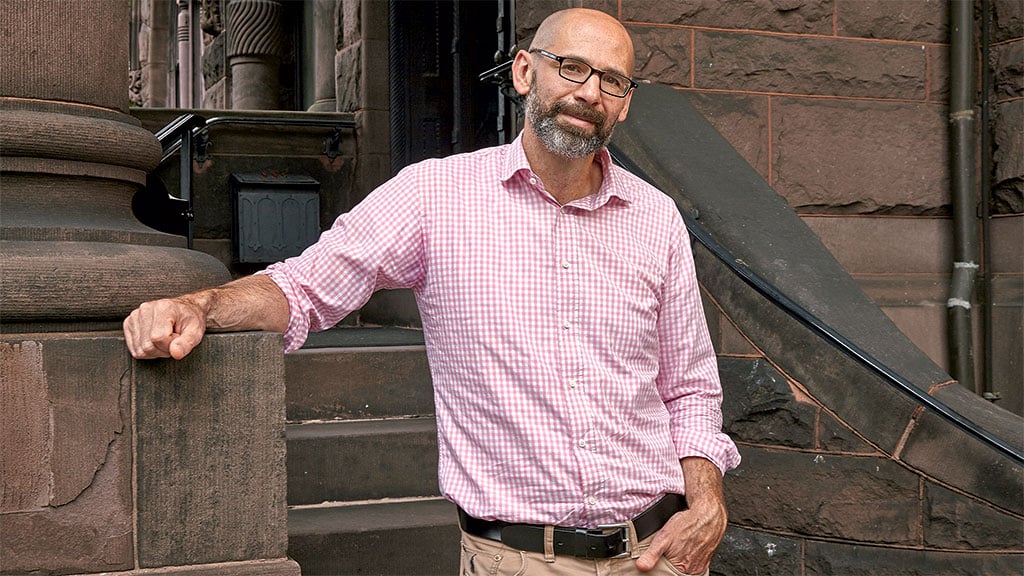One day in 2014, soon after David Plotz left his job as editor of the online magazine Slate, he took his then 13-year-old daughter, Noa, on a bike ride through Anacostia. Noticing how many places he saw named for forts, and how few actual forts he saw, Plotz returned home to Woodley Park. There, he looked at a map of DC that showed the city ringed with current and former redoubts, many of them Civil War defenses. A few days later, he dragged his family through Rock Creek Park to Fort DeRussy, a garrison that the forest had all but taken back. It was a reminder, Plotz says, that “Washington has surprises—but it takes an act of will to allow yourself to see them.”
Plotz is now CEO of Atlas Obscura, a digital publication that brings those moments to readers’ screens, inviting them to gawk at places such as the Rock of Kamegeri in Rwanda or Japan’s Tashirojima Island, which is populated primarily by feral cats. These travelogues, reviews of eccentric tourist spots, and off-road explainers—THE BLOBBY, DAZZLING WORLD OF INSECT EGGS, read a recent headline—are produced by concentric circles of staff writers, a community of enthusiasts who volunteer their own discoveries, and companies that sponsor articles to connect with Atlas Obscura’s audience of mobile young people with discretionary income.
As with any media company today, Atlas Obscura is also searching for new ways to sustain its mission. “Obscura Societies” in various cities lead tours of local sites—the Washington chapter recently visited the Poplar Spring Animal Sanctuary in Poolsville. (Washingtonian contributor Matt Blitz heads Washington’s Obscura Society.) The company also produces videos, maybe soon to be followed by a TV show, and a book is due in September, with an initial printing of 100,000. Oh, yeah—it’s becoming a travel company, too.
The travel business may be what turns Atlas Obscura from a digital refuge for well-traveled dreamers into a viable company, and it happened almost by accident. In April, Plotz was at Tudor Place in Georgetown for a party celebrating Obscura Day—a once-a-year event at which Atlas Obscura employees and contractors around the world lead tours of homegrown weird and wonderful places. (Plotz conducted a tour of Fort DeRussy.) At the party, Plotz found himself discussing with Carl Shephard—whose travel agency, Insider Expeditions, arranges tours for alumni networks and other groups—Cuba’s sudden popularity as a travel destination. In the following days, the two put together a little trip to Cuba and told one of Atlas’s smaller e-mail lists about it. It sold out immediately, with a waiting list long enough to sell out two more trips.
Trips to fabulous destinations, it turns out, are something a lot of people actually want, unlike other traditional forms of support for journalism. “Advertising they can take or leave,” Plotz says of Atlas Obscura readers. “This is something that we’re not only making money from, but we’re giving them something that they really long for.”
• • •
Plotz’s transition from journalist to wonder merchant is as unlikely a journey as, say, an Atlas Obscura jaunt to the Mano del Desierto in Chile’s Atacama Desert. As a Slate employee from its founding in 1996, the DC native says, “the poisonousness and stupidity of American politics really began to drag on me.”
Plotz had just liberated himself from Slate—resigning “without any secret reason,” he told the press at the time—when he attended the 40th-birthday party of Franklin Foer, then editor of the New Republic and an elder brother of Joshua Foer, author of the 2011 science bestseller Moonwalking With Einstein. The younger Foer, a former Slate intern, had launched Atlas Obscura with travel writer Dylan Thuras as a kind of blog. With a CEO, the bloggers thought, they could turn their oddball idea into an actual business. Plotz surprised himself by volunteering for the job. “I’d expected to have months of playing golf and going for bike rides” before getting a new gig, Plotz says. Most important, “I didn’t want to be the editor of something.”
Plotz embarked on what entrepreneurs call a road show, pitching Atlas Obscura to investors. Despite his years online, he’d never needed to talk up his company—Slate was always lucky to have deep-pocketed owners, from Microsoft to the Washington Post Company to Don Graham. Now he was addressing roomfuls of “people who are generally smarter than you are” with a cobbled-together PowerPoint deck.
“It was much more of a story that he was telling,” says John Backus, managing partner at NAV, a venture-capital firm in Reston and now an Atlas Obscura board member. “We don’t normally do pure content companies because they’re hit-and-miss—it’s kind of a hits business. But I was like, wow, this is a guy who’s an entrepreneur. He’s backable.”
It helped that Atlas Obscura wasn’t exactly a pure content company. Its mission is to delight you, then get you off your couch and out into the world. “I love the idea of marrying an online community with real-world experiences,” Backus says. Other investors include Bryan Goldberg, who has constructed successful media companies such as Bustle and Bleacher Report, as well as venture capitalist Thomas Lehrman and Business Insider cofounder Kevin Ryan.
When Atlas Obscura closed that funding round, Plotz described the company to the Wall Street Journal as like “if National Geographic and Vice had a baby,” though he also floats the shorthand of “Nice Vice.” Like Vice, a New York media company oriented toward gonzo adventure journalism, Atlas Obscura could end up as a robust content studio and TV producer for brands trying to reach free-spending, globetrotting millennials. (A television show, produced by the company behind the TV version of radio’s This American Life, is in the works.) Like National Geographic, it could make its nut by putting people in front of the hidden treasures it obsesses over.
For now, Plotz is trying to keep costs down. He travels to the headquarters in Brooklyn three days a week to commune with the company’s 19 employees, but he takes the slow train and stays with his in-laws in Queens. The company has a “runway,” Plotz says—enough financing to exist until it reaches profitability—but not an infinite one. “Everyone is acutely aware that we need revenue.”
It sounds ambitious, then, when he intimates that this scrappy start-up could somehow take a bite out of the yellow-bordered money factory that is National Geographic. But Kevin Ryan points to the fact that Business Insider passed the Wall Street Journal in web traffic and to the way internet shopping has wreaked havoc on traditional retailers. “Every single time, the online player wins,” says Ryan. “Every single time, the original player thinks it can’t happen.”
Atlas Obscura, of course, is in the business of making believers. One more party story: Last year, the site took over a bar in Brooklyn’s Greenpoint neighborhood, near its office. As the staff gathered, an animal handler from a preserve up in Westchester County led a wolf through the bar. Every drink was stayed as the wolf’s claws clacked across the reclaimed-wood floors, searing a permanent memory into the mind of everyone there.
“It’s a very naive thing for a person who’s worked in cynical journalism for 25 years,” Plotz says, “but honestly, it’s a great feeling to know that you create something magical for people.”
Senior editor Andrew Beaujon can be reached at abeaujon@washingtonian.com. On Twitter, he’s @abeaujon.



















